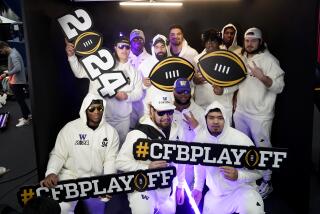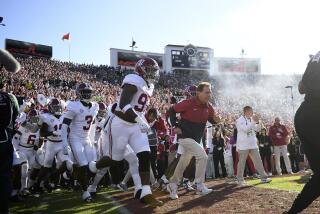How Wisconsin Copes With Death of McClain
- Share via
CHICAGO — The news came swift and hard on the University of Wisconsin campus last spring.
Dave McClain, head football coach at the Big Ten school, had completed working out just as he had done so many times during his eight-year tenure. Then he had a heart attack and dropped dead.
Shockingly, Wisconsin was without a head football coach, a leader. Jim Hilles, assistant coach and defensive coordinator, was called upon to pick up the reins.
McClain had tabbed Hilles to serve as assistant the previous year, clearing the way for a possible successor should McClain decide to leave the school.
Hilles knew his first job had to be something other than what formations he would use in the 1986 season or his three-deep chart. What he understood was the traumatic shock to players still in their teens. He drew from his staff--and from himself--to cope with the situation. He credits assistant coach Kurt Humes with providing most of the initial guidance.
“We had on our staff someone who had worked at Kent State where the head coach, Dick Szeniak, died four weeks before Dave McClain the same way after a physical workout,” Hilles said. “He went over to the funeral, talked to their coaches, who made suggestions as to what they could do to get the squad through the first 10 days of extreme grief.
“I jumped right in and took control,” Hilles recalled. “The very day it happened, we had a squad meeting. He was pronounced dead at 3 p.m. and we had the squad meeting set for 5 p.m. To get the squad over there was important so we could get involved with them.”
The most difficult aspect for Hilles and his staff was the handful of players who had actually witnessed McClain’s death.
“Unfortunately, there were about 15 or 16 of our athletes who stood in the hallway outside the room where attempts to revive the coach were being made,” he said. “It was those 10 to 16 that we worried about the most. It was an attempt to get them back to the scene so they didn’t leave school that day so they wouldn’t have bad feelings about where this tragedy took place.”
During the following week, Hilles and his staff forgot about being football coaches; they became counselors to the young men.
“Every day for the next five days through the memorial service for Coach McClain we had all of our positions at the stadium for some type of meeting,” said Hilles, who serves as interim head coach until the Wisconsin athletic administration decides on a full-time successor. “We also had three additional squad meetings. We didn’t accomplish much but we did confront the issues we faced. Each day, it did get a little bit better. That first meeting, the players could hardly look each other in the eye. I had a difficult time addressing the squad.”
So often, Hilles conceded, fans forgot that college athletes are still impressionable young men.
“Sometimes we do forget but that is the great thing about this profession,” said Hilles, 49, who had spent six years at Ball State before coming to Wisconsin. “I like to think through 29 years of coaching that this is something that I had to say and communicate with youth. I feel that I can do that. We tend to look at accomplishments on the field and compare them to the pros. You can’t do that.”
It was a major adjustment for Badger players, Hilles discovered, to accept the death of the man who had been their coach, leader and father figure for anywhere from one to four years.
“I think being able to accept the death was the biggest problem and to get around to the way of thinking where you must push on,” he said. “We had 55 players stay in Madison during the summer, specifically to be around each other, the coaches and facilities to develop cohesiveness. With the tragedy, we believe we have come together and been together.”
Hilles and Wisconsin have carefully addressed the issue of paying tribute to McClain without overdoing it. The Big Ten has adopted a coach of the year award in McClain’s honor and there have been other private tributes in and around Madison.
“I don’t intend to make a big deal out of the tragedy,” Hilles said. “We won’t belabor the death. We will have a memorial to him on our uniform. We’ll let it stay with that. We have so many things to accomplish that we can’t let a tragedy take us away from that. I don’t want to appear crass but we must get ready for the season.”
Hilles will count on the upperclassmen to exhibit leadership, especially if things don’t go exactly right for Wisconsin early in the year. The Badgers lost their season opener, 20-17, at Hawaii on Sept. 6, indicating much work is yet to be done.
More to Read
Go beyond the scoreboard
Get the latest on L.A.'s teams in the daily Sports Report newsletter.
You may occasionally receive promotional content from the Los Angeles Times.










